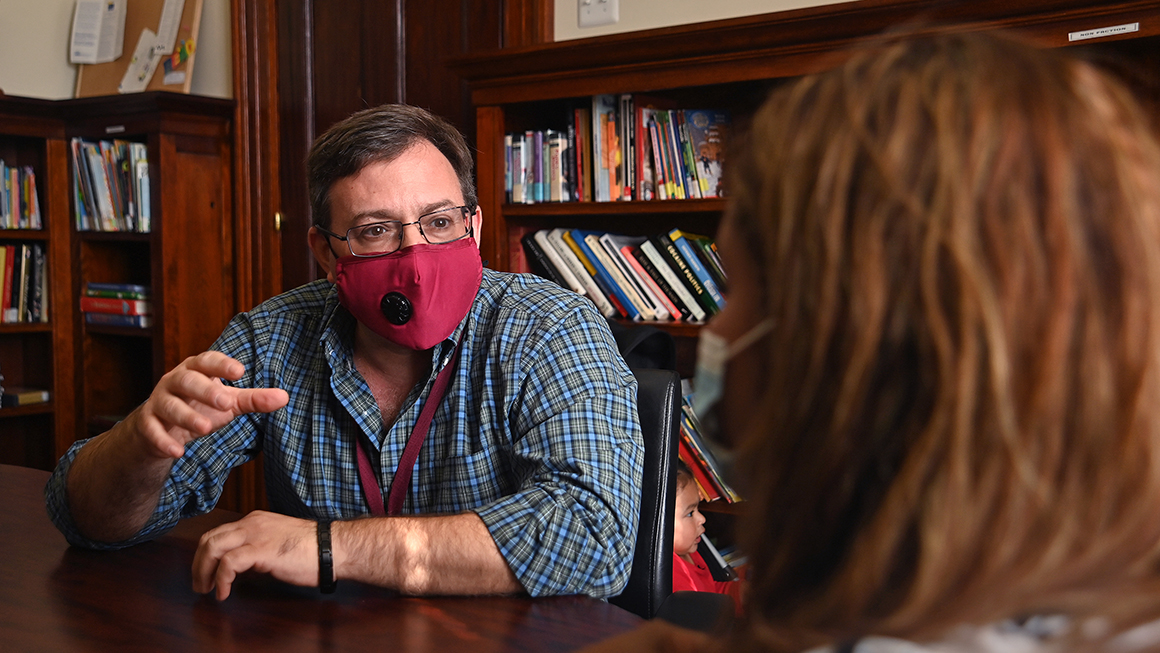
The expanded child tax credit (CTC) provided unprecedented economic relief to nearly 40 million families. But because tax filing can be especially complicated for some immigrants, Latine families disproportionately missed out on the tax benefits, despite “whole-of-government” outreach efforts.
In new research, we explore lessons learned from expanded CTC outreach to immigrant families in the Boston region, highlighting the importance of trusted messengers working with immigrant communities to counter the prevalence of competing and misleading information.
This Hispanic Heritage Month, we spoke with Angela Divaris, an attorney with Greater Boston Legal Services's Low Income Taxpayer Clinic, which provides free civil legal assistance to low-income families in and around Boston. During the pandemic, the organization pivoted to targeted outreach and tax filing services to help eligible families access tax benefits—especially those at risk of missing out.
Divaris is a crucial leader in reaching the region’s Latine immigrants, especially mixed-status families (PDF). Together with our findings, Divaris’ recommendations can be a roadmap for places across the country looking to improve immigrant communities’ uptake of eligible government programs.
What specific hurdles do Latine communities have to overcome to learn about and claim government benefits like the expanded CTC?
If you were in a household known as a “nonfiler,” or those who had not filed tax returns recently (likely because they lacked a filing requirement due to low earnings), the Internal Revenue Service (IRS) was unable to immediately send out advance CTC payments to you.
The Treasury Department released data identifying the numbers of kids likely to be left out by zip code. But how could we get to them? Outreach was key.
People told me that they kept hearing from others that the CTC was not for them. So just putting out eligibility information was not enough. It was important to hear from people they trust, like school liaisons or health care workers, and see it in other media, like newspapers or flyers at food sites.
With the previous federal administration’s messaging, immigrants were afraid of trying to access government assistance. People were “chilled” from coming forward even if they were eligible.
Many didn’t know where to get help. Families had to file tax returns, and many had to apply for ITINs (Individual Taxpayer Identification Numbers). And people needed access to live assistance. While the IRS’s Volunteer Income Tax Assistance (VITA) program is great, it needed more multilingual staff and more locations in immigrant communities.
Could you briefly describe the activities you undertook to guide Latine folks to the expanded CTC and to help them claim tax benefits?
When ARPA (the American Rescue Plan Act) was passed, we quickly realized the magnitude of financial help it could provide to families.
We contacted state and local agencies that might be in touch with eligible families: schools, health centers, shelters, community centers, domestic violence counselors, churches, and so on. We organized information sessions with advocacy organizations, trained their staff on how to talk about the CTC, and asked them to direct families to us.
We also embedded ourselves in an immigrant community and created a pop-up VITA site at a well-known community agency, La Colaborativa in Chelsea, with the specific goal of having a physical presence near families likely to miss out.
We put our contact information in wider statewide informational outreach (e.g., Department of Transitional Assistance texts).
I became a Certified Acceptance Agent (CAA) so that I could help parents without Social Security numbers (SSNs) apply for the required ITINs. I knew CAAs were not readily accessible for most people.
Altogether, I recall how hard we worked, but at the end of the day, we were just one tax site in one neighborhood.
What are you most proud of with your outreach to Boston’s Latine communities?
I was proud of crafting messaging for immigrant families and for trusted messengers working closely with immigrants in nontax settings. We gave people a place to get live tax-filing support. And our guidance to them wasn’t about the nitty-gritty of tax procedures.
We prioritized their native language, simplified information, and reassured them across various media. We wanted Spanish-speaking families to understand that they were eligible, it was safe to come forward, and how to claim the relief.
In terms of administering such programs and conducting outreach efforts, what is one thing you would ask federal, state, and local governments to do differently?
We can all be more attuned to how immigrants are affected by tax laws.
On the one hand, ARPA made US citizen children of immigrants without SSNs eligible for the expanded CTC, but I’m not sure if they thought through the mechanisms of getting the credit to them. It was foreseeable that because of the 2015 Protecting Americans from Tax Hikes Act’s rules, many thousands of otherwise eligible kids would be left behind because their parents were facing a little-known deadline. Lawyers at GBLS, lawmakers, and other organizations are asking the IRS commissioner to extend the April 2022 filing deadline for immigrant families who missed out due to the timing of applying for ITINs or SSNs.
Immigrants pay taxes. They are often “essential workers.” I so often meet ITIN applicants who just want to do the right thing, report their incomes, and file their tax returns. People’s preconceptions about Latine communities hinder them from seeing the net benefits to us all. Some state governments are beginning to understand this and are changing their programs’ rules.
I like the Spanish word for taxpayer: “contribuyente,” which, to my mind, reinforces this idea of how we should all be considered as “contributors,” even when we need help during a pandemic.
Let’s build a future where everyone, everywhere has the opportunity and power to thrive
Urban is more determined than ever to partner with changemakers to unlock opportunities that give people across the country a fair shot at reaching their fullest potential. Invest in Urban to power this type of work.